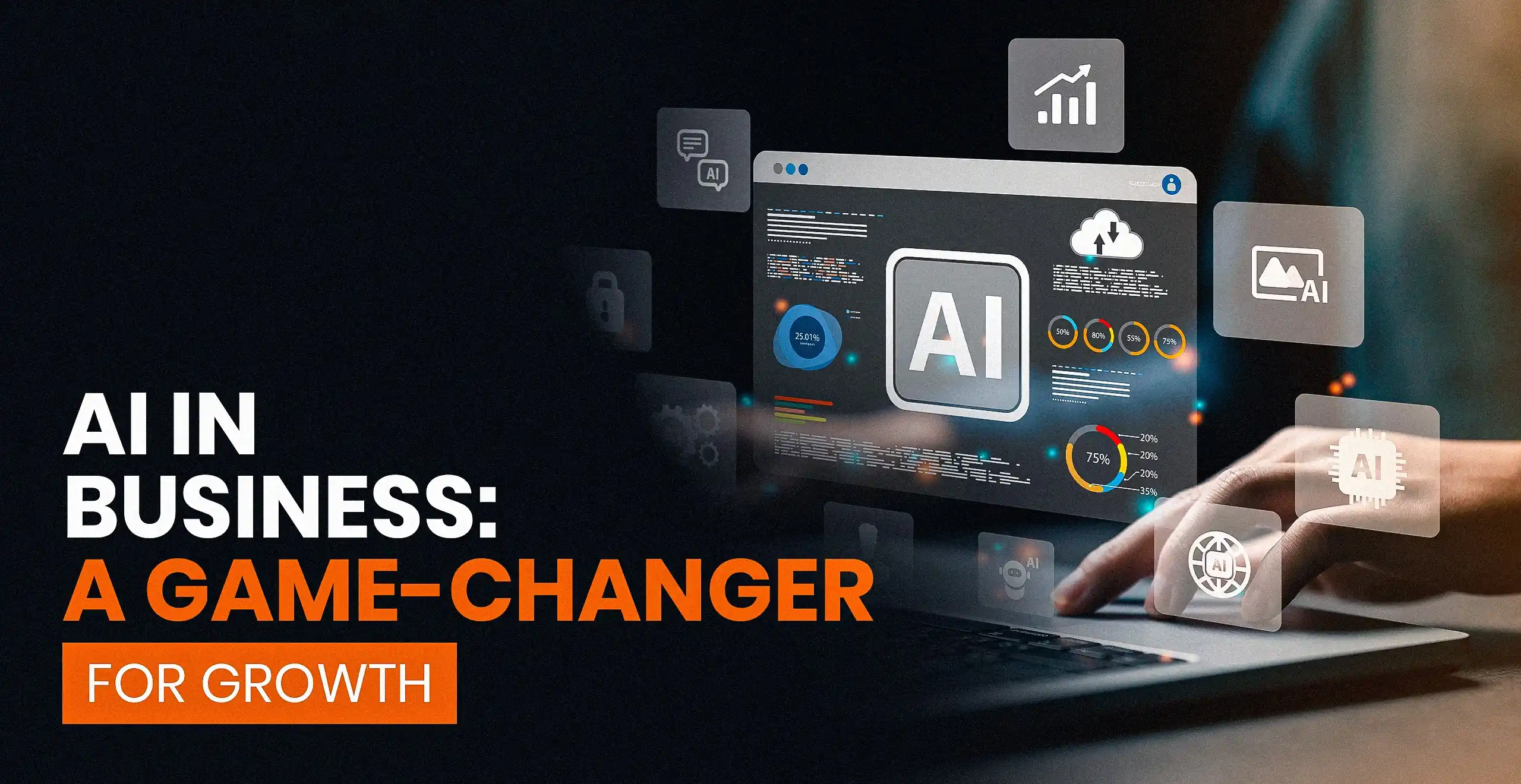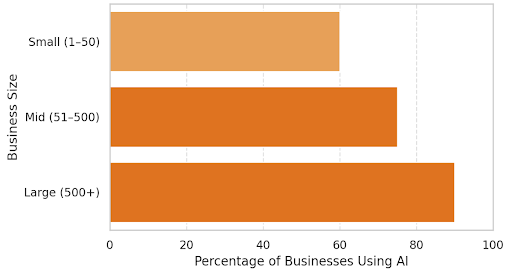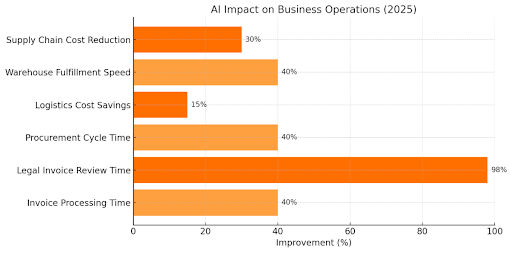Top Uses of AI for Business and Why They Matter

84% of business leaders say AI gives them a competitive edge. That’s not a stat, it’s a wake-up call.
AI in business isn’t just a buzzword anymore. It’s the engine behind faster decisions, smarter operations, and sharper marketing. From startups to enterprises, brands are moving beyond basic automation and weaving AI into the very fabric of their business.
Tools like Tesseract by AdLift are helping companies do just that, by turning AI into real results. Let’s break down how AI is used in business today and why it matters more than ever.
How AI Is Used in Business to Enhance Customer Experience
In today’s experience economy, the brands that win are the ones that listen, learn, and respond, instantly. AI is making that possible at scale. How? Let’s find out.
AI-Powered Chatbots and Virtual Assistants
AI is rewriting the rules of customer service. Think:
- Faster responses across web, mobile, and social
- Fewer tickets, better accuracy
- No waiting, no human burnout
Example: Sephora’s AI chatbot boosted conversions by 11% with tailored makeup tips. That’s AI for business in action, personalisation that pays.
According to a 2024 McKinsey report, 65% of companies using generative AI in customer service saw response times cut in half.
| Metric | Traditional Support | AI-Powered Support |
| Avg. Response Time | 12 mins | <5 mins |
| Resolution Rate | ~60% | 85%+ |
| Cost Per Interaction | ₹25–₹35 | ₹5–₹10 |
| Simultaneous Conversations | 1–2 per agent | Unlimited |
Before and After AI: Customer Support Impact
Hyper-Personalised Recommendations
It’s never “one-size-fits-all”. AI is helping brands deliver personalisation at a scale that was previously impossible.
- It learns from user behaviour and buying patterns
- Tailors suggestions in real-time
- Adapts to changing preferences on the fly
Example: Netflix uses AI to drive 80% of its watch time. That’s not guesswork—it’s deep learning in action.
And here’s why it matters: personalised marketing can bump up revenue by 10–15%
AI for Business Marketing: Optimisation and Content Creation
In a world flooded with content, relevance is everything. AI is helping marketers cut through the noise, and do it faster, cheaper, and better. How? Though predictive analytics and content creation
With AI you can:
- Predict how a campaign will perform before launch
- Create copy with tools like ChatGPT and Jasper
- Publish faster, spend less
75% of marketers say AI helps them deliver more relevant content and boosts engagement. Tools like Tesseract go a step further serving up insights that reduce manual effort and scale smart content faster.
Bottom line: AI levels the playing field. Now small teams can deliver enterprise-grade campaigns, and that’s one of the biggest benefits of artificial intelligence in business today.
Also Read: How to Use the Perplexity AI Tool to Level Up Your Work
Using AI in Business Sales and Lead Generation
AI is becoming a secret weapon for sales teams, helping them work smarter, prioritise better, and close deals faster.
Sales teams no longer chase every lead, they chase the right ones.
- AI ranks leads based on who’s ready to buy
- Helps reps prioritise high-value prospects
- Forecasts trends with surprising accuracy
Example: HubSpot’s AI-based lead scoring increased sales productivity by 20%. That’s how AI is used in business to turn data into deals.
How AI Enhances Sales Efficiency
| Traditional Sales Funnel Stage | With AI Intervention | Result |
| Lead Qualification | Predictive scoring algorithms | Higher conversion probability |
| Follow-ups | AI-powered CRM prompts | Shorter sales cycles |
| Forecasting | Historical + behavioural inputs | 20–25% more accurate predictions |
Benefits of Artificial Intelligence in Business Operations and Automation
AI isn’t just for customer-facing tasks. Behind the scenes, its transforming operations, improving efficiency, and saving serious money.
Process Automation and Supply Chain Optimisation
AI handles the grind while you focus on growth.
- Automates routine admin work, data entry, invoicing, HR
- Tracks supply chain data in real-time
- Predicts demand and prevents delays
This is where AI shows immediate ROI: lower costs, fewer errors, smoother ops.
AI in Human Resources: Smart Talent and Retention Decisions
Hiring, onboarding, and retaining talent is more data-driven than ever. And AI is giving HR teams the intelligence to make smarter people decisions.
Talent Acquisition and Employee Retention
Hiring has never been this smart.
- AI scans thousands of resumes in seconds
- Flags top talent based on real fit
- Spots churn risks before they become resignations
Companies using AI for HR report up to 50% lower hiring costs, 25% higher retention, and faster time-to-hire. That’s the benefit of artificial intelligence in business talent strategy hire better, keep longer.
How Artificial Intelligence Supports Finance and Risk Management
Finance teams are turning to AI to spot patterns, flag risks, and future-proof their decisions. Though fraud detection and financial forecasting, AI:
- Flags anomalies faster than human teams
- Spots patterns to catch fraud before it hits
- Models complex financial scenarios for smarter planning
AI-driven fraud detection cuts false positives by over 50% and stops up to 89% of phishing attempts. In business terms? That’s peace of mind at machine speed.
Product Development: Innovative Uses of AI in Business
From ideation to launch, AI is accelerating the product development lifecycle. Fewer delays, fewer duds, more wins.
Rapid prototyping and AI-driven testing speed up R & D by:
- Simulating product performance across test conditions
- Reducing costs and development time
- Catching issues before they become expensive
AI-generated design and feedback loops:
AI helps businesses test, learn, and iterate, on repeat.
- Generates multiple versions based on usage data
- Analyses patterns in real time
- Adapts UX for better engagement
Think of it as an always-on product lab. One of the most agile and powerful uses of AI in business today.
Cybersecurity: Business Use of AI for Threat Detection
In an age of rising cyber threats, AI is becoming a digital bodyguard, watchful, tireless, and fast.
Enterprise protection is strengthened through:
- Identifying cybersecurity threats within seconds
- Detecting phishing, malware, and system anomalies before damage occurs
- Automating response protocols to neutralise risks at scale
AI-enabled platforms now resolve over 50% of alerts automatically and slash incident response time by up to 80%. That’s how AI helps businesses stay secure and resilient.
Why These AI Applications Matter for Growth
Let’s talk outcomes. The benefits of artificial intelligence in business aren’t theoretical, they’re tangible:
- Productivity: Free up teams to focus on strategy
- Profitability: Automate costs, boost margins
- Smarter Decisions: Data-backed, real-time insights
- Customer Loyalty: Personalised experiences that stick
- Scalability: Grow without growing headcount
Also Read: Will Google Penalize AI Content in 2025
AI Limitations and Risks for a Balanced Perspective
While AI offers tremendous benefits, it’s important to acknowledge some of the challenges and risks businesses should consider:
- Ethical and Privacy Concerns: AI systems rely heavily on data, often including sensitive customer information. Businesses must ensure compliance with data privacy regulations (like GDPR or CCPA) and adopt ethical AI practices to avoid misuse or bias.
- Data Quality and Bias: AI’s effectiveness depends on the quality and diversity of data it learns from. Poor or biased data can lead to inaccurate predictions, unfair decisions, or reputational risks.
- Human Oversight Needed: AI can automate many tasks but lacks human intuition, creativity, and empathy. Combining AI insights with human judgment ensures better outcomes and avoids over-reliance on algorithms.
- Implementation Costs and Complexity: Deploying AI solutions requires investment in technology, talent, and change management. Businesses should plan carefully to align AI initiatives with strategic goals and realistic budgets.
By addressing these factors, companies can adopt AI responsibly and sustainably, maximizing benefits while minimizing potential pitfalls.
Want to explore how AI in business can work for you? From content and marketing to operations and growth, Tesseract by AdLift has you covered. It’s time to work smarter.
As one of the top AI optimization agencies, we help businesses unlock real value through tailored AI strategies and tools. It’s time to work smarter.


